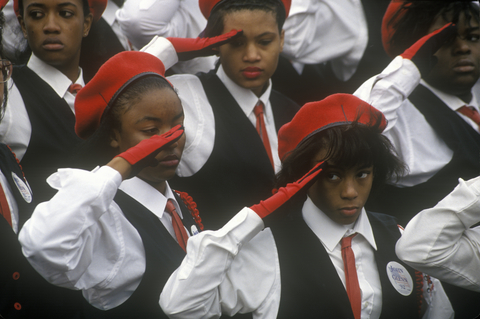|
© Americanspirit | Dreamstime.com - Young African-American Women Salute Photo
“Unbought and unbossed” black women are here, fellas.
Olivia Pope, the iconic character played by Kerry Washington in Shonda Rhimes' popular political drama TV series Scandal, is symbolic of the political and economic ascendancy of black women in the USA. Once an innocent, blithe, daddy’s baby girl, Olivia is now an independent, decisive, thick-skinned power player in the dangerous world of American politics ruled by alpha males. If you put aside the scandalous love affairs, entertaining political chicanery and exploited personal flaws, a powerful black woman stands center stage. What makes her so special?
She embodies three fundamental qualities that make her a successful political power broker. She has the audacity to hope and be all she can be in a world full of obstacles. She is well-educated, extremely intelligent and can think on her feet. And, finally, she knows how to survive and thrive in the game of power, she never gives up, and she wants to use politics to make the world a better place.
Those same qualities are actually the three reasons why black women are increasingly becoming political gladiators in the USA today. The three integral factors behind the recent political ascendancy of black women in the twenty-first century are: the audacity to hope under the weight of the overlapping oppressions of racism and sexism, the ambition and hard work to take advantage of higher learning, and the endurance to play and stay in the game of politics in order to nurture a just society. The black woman's plight in America is unique and is arguably the most burdensome. Since the beginning of their stay in the land of the free, black women on the whole were forced to reside in the American political and economic basement. They endured the intersecting oppressions of racism, from white men and white women, and sexism from white men and black men. They were, in a sense, oppressed within their already oppressed black communities. But, black women resolved to assiduously overcome their cultural, social, economic and political obstacle course. They decided that their voices would not remain silent and that their bodies would not be indefinitely bound by man-made cultural, social and religious proscriptions. In the 1830s, they began to stand up and speak out. Maria W. Stewart, the "first black woman political writer," sounded a call to duty that continues to ring today. Stewart charged black women to realize their potential in politics, economics, education, and in their religion (namely Christianity). In her address to the American Female Intelligence Society of America, Stewart proclaimed: "O woman, woman! Upon you I call; for upon your exertions almost entirely depends whether the rising generation shall be any thing more than we have been or not. O woman, woman! Your example is powerful, your influence great; it extends over your husbands and your children, and throughout the circle of your acquaintance." (Maria W. Stewart: America's First-Black Woman Political Writer) Countless black women, those who were inspired by Stewart’s inspirational words and those struck with a similar conviction, signed up to beat back the behemoths of racism, classism and sexism. Women such as Frances Harper, Anna Julia Cooper, Sojourner Truth, and Ida B. Wells are some of the key founders in the nineteenth century of an unsung crusade for justice for black women and men, including all other oppressed souls. The unwavering hope, which we hear in Stewart's words, galvanized these ladies to lay the groundwork for others to travel and to take up their crosses and go on to accumulate a multitude of breakthroughs in the USA, during the past two centuries. The second noteworthy factor responsible for the ascendancy of black women is education. They activated their dreams with higher learning to become religious leaders, writers, teachers and politicians. There is no doubt that black women have clenched the opportunity to get a college education today. Presently, black women are leading the nation in college attendance. Here are a few details that will grab your attention. The Journal of Blacks in Higher Education, a scholarly peer-reviewed academic research journal on black educational matters, keeps a close eye on the trends in education among black Americans. Research confirms black women are an undeniable thriving force in higher learning. First of all, "black women make up 58 percent of all the African Americans who have completed four or more years of college in the USA.” In fact, they make up "62 percent of all African Americans with master's degrees." Indeed, black men have historically maintained a lead over women in professional and doctorates degrees, but black women are quickly closing the gap. In recent years, the tables have begun to turn, as black women receive close to "two thirds of all new professional degrees earned by African Americans" and 65 percent of the doctorate degrees awarded to black people. In fact, black women now exceed black men "in enrollments in almost all undergraduate and graduate programs" and they are expected to outnumber black men with a “bachelor's degree by a ratio of 2 to 1." And, as zealous members of the elite educated class, “black women also hold a majority of all African-American enrollments in law, medical, and dental schools." Speaking of enrollment, it seems that black women are actually ahead of all groups in college enrollment—that includes black men, Asian women and men, white women and men, and Hispanic women and men. (See http://www.clutchmagonline.com/2014/02/know-black-women-lead-groups-college-enrollment-watch/; http://blackyouthproject.com/black-women-lead-all-groups-in-college-enrollment/) Why is this achievement in higher learning important? Studies have repeatedly and decisively shown that education is one of the best instruments to "close the black-white income gap" and one of the best weapons to “[break] the back of race discrimination.” The third reason why black women are political gladiators is that they learned the game of politics, fearlessly jumped in it, and are taking the political stage by storm. While the largest voting bloc in the USA are women, women of color, in particular, are the is the fastest growing voting constituency. Women of color "represent" half of the impending majority. In fact, they played an major role in getting Obama elected in 2008 and in 2012. That's right. Women of color hold a decisive advantage in the electorate. And within this group, black women are proving to be some of the most fervid citizens to be engaged with the political process. In fact, they "represent the largest share—43 percent—of vote-eligible women of color and 13.4 percent of all vote-eligible women,” and they accounted for 55 percent of eligible black voters. This is why black women were even more critical than most other voting blocks to the 2008 and 2012 presidential elections. In fact, their turnout rate was 74 percent, of which 96 percent supported President Obama. A recent editorial in The Washington Post discusses the powerful role black women are expected to have in the upcoming presidential election. Keeping in mind that "black women voted at a higher rate than any other group," political experts are deliberating whether they will turn out just as big as they have in the past two presidential elections. The focus and dependence on the black women’s vote is extraordinary given that women of color, particularly black women, face daunting obstacles to voting. Not to mention that just approximately ten years ago, the black voter turnout was roughly 47 percent. It jumped to 69 percent in 2008 and 67 percent in 2012, according to The Washington Post. Confluent with their increasing involvement in politics and voting, more black women are occupying seats of political power. To celebrate Women’s History Month, The Root commemorated thirty-one top black females “flexing their muscles in elected office, the Obama administration and the judiciary.” Some of whom are Valerie Jarrett, Lisa P. Jackson, Susan Rice, and Maxine Waters, and Kym Worthy. To be sure, the explosion of black women in politics that I am honoring is recent, and there is a very long road ahead, as Dr. Kelly Dittmar and Glynda Carr confirm. Nonetheless, Shirley Chisholm, the first black women elected to Congress, founding member of the Congressional Black Caucus, and the first major black candidate to run for president of the USA, would be proud. Chisholm would be thrilled to see so many of the barriers that hindered women falling apart today, because she was well acquainted with the women's struggle and was fed up with the status quo in her day. In her book Unbought and Unbossed, Chisholm asked: “Why are women herded into jobs as secretaries, librarians, and teachers and discourage from being managers, lawyers, doctors, and members of Congress?” Her answer was—“Because it is assumed that they are different from men.” Chisholm exemplified the three strategies to disprove that assumption. First, she reminded us to hoped "in spite of hopelessness" in order "to demonstrate the sheer will and refusal to accept the status quo." Second, she taught us that "education, no doubt, is the key to long-range, although jobs and decent housing are the immediate needs." And, third, challenged us to be political. She explained: "'I'm not a fool, brothers and sisters,' I have told extremists groups. 'I'm a pragmatist. What is the sense of shooting, burning, killing? What will it bring? . . . You are fourteen or fifteen percent of the population, with no real economic or political power.'" (Unbought and Unbossed) Black women, it seems, have heard Chisholm loud and clearly. In sum, joining the ranks with Maria W. Stewart and Shirley Chisholm, black women have come a long way. White supremacy and patriarchy could not prevent them from scoring phenomenal achievements in the grand American political and economic Olympics. Their recent feats are admirable and instrumental, not only because they help African American racial uplift, but because they also are victories for all Americans. One step forward for black women is a leap for American society. Lastly, in no way do I mean to put black men down or discredit the social trappings that sabotage them (i.e., the pre-K to prison pipeline). Nor, do I mean to disregard the achievements of other women. I'm simply pointing out the undeniable progress of black women in the modern politics in order to show that hope, higher education, and determination in politics, as black women have proven, are reservoirs of empowerment and shuttles to progress. Comments are welcome. And, don't hesitate to recommend topics you'd like me to address. Sign up to receive future blog posts and updates on Voting Matters events via email. All subscribers before the release will receive a 20% discount off my upcoming book Voting Matters: Don't Sleep on the Polls.
1 Comment
Blythe Dhai
3/11/2016 05:31:21 pm
Great read right after International Women's Day. I'd like to see more Black women in decision making roles. Yea- they let us in, but many of us still feel marginalized or dismissed when we work in White boy clubs. It's so of how Hillary can't ever stick to her guns w/o men swaying her this way or that.
Reply
Leave a Reply. |
About the blogThis is Kasaun's blog on the significance of voting, particularly in America. The goal is to get every American voting in local and national elections. Archives
July 2018
Categories |


 RSS Feed
RSS Feed
